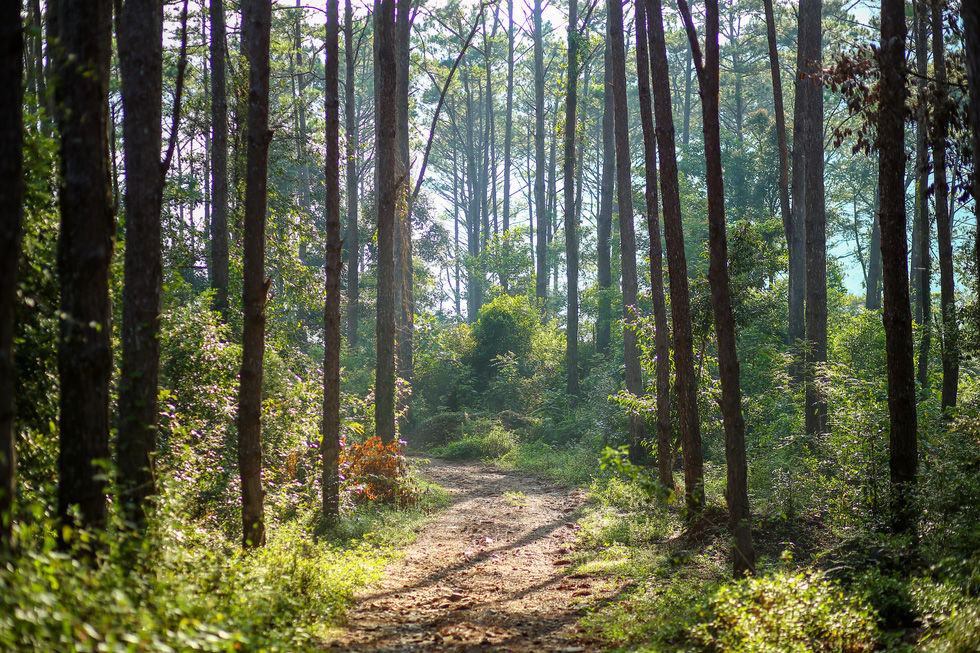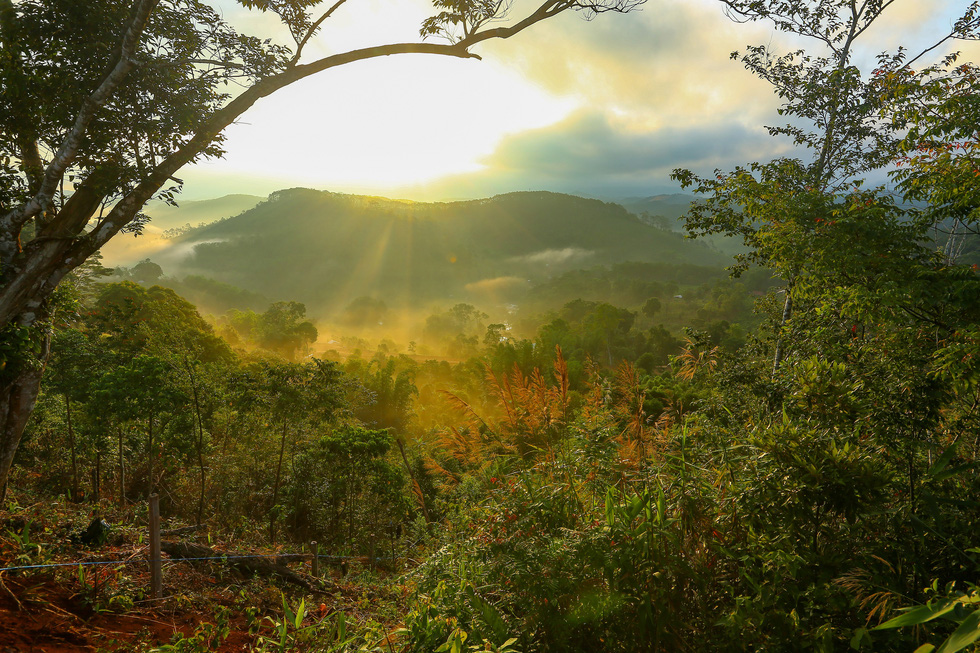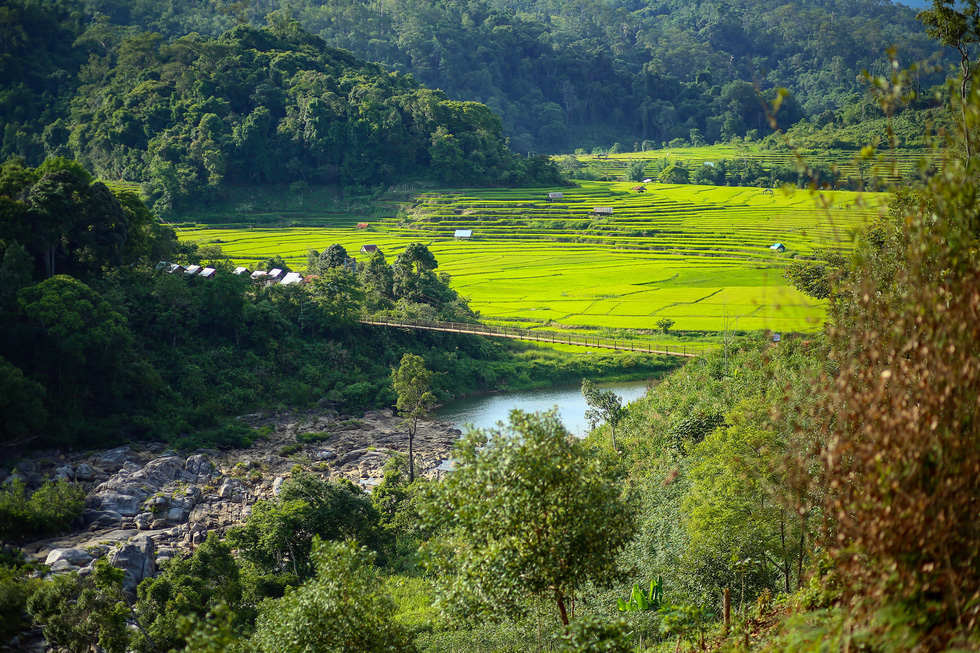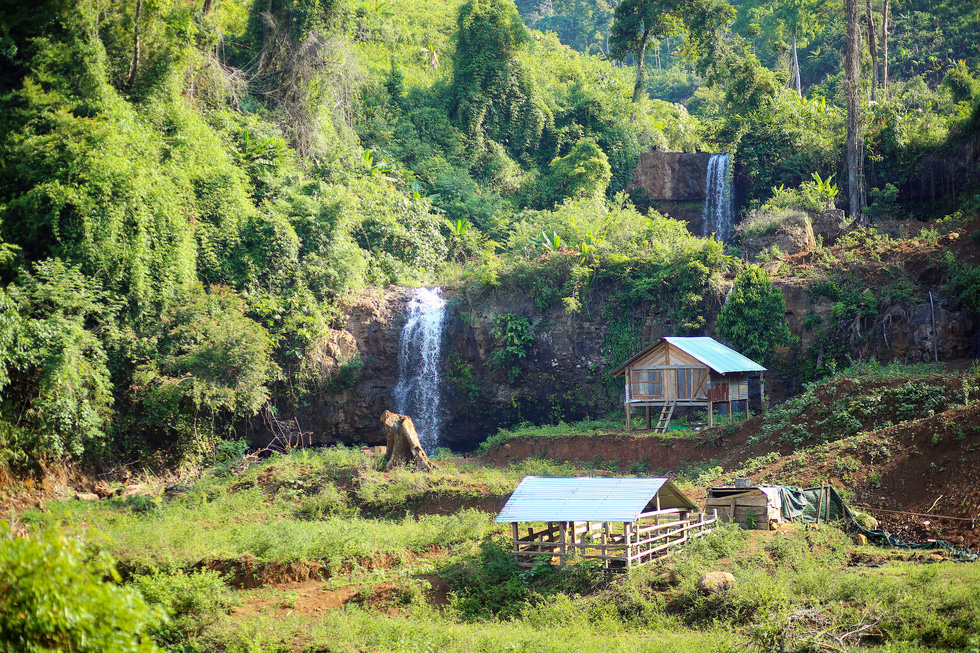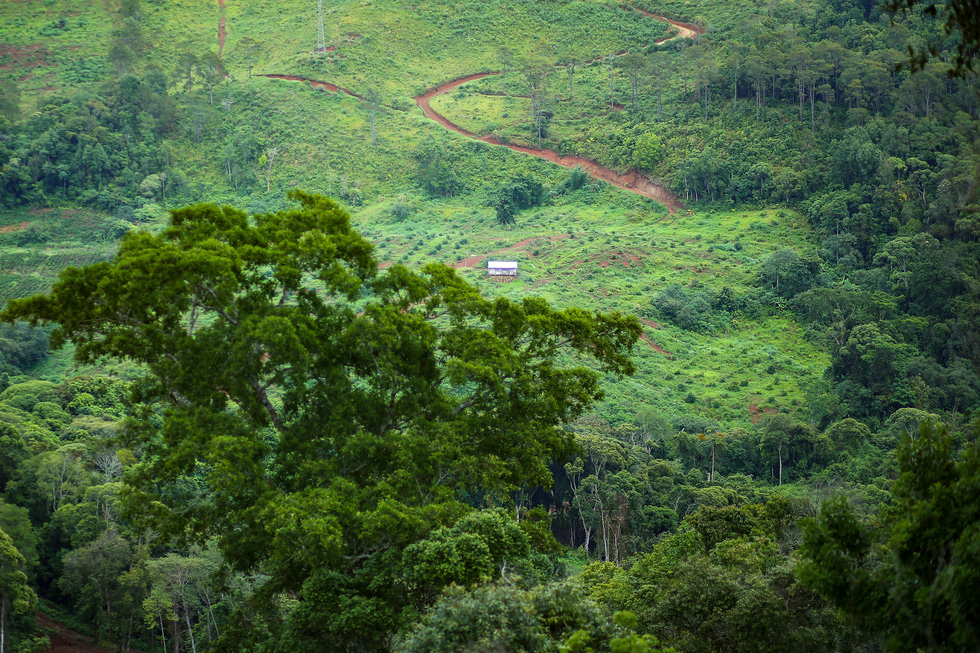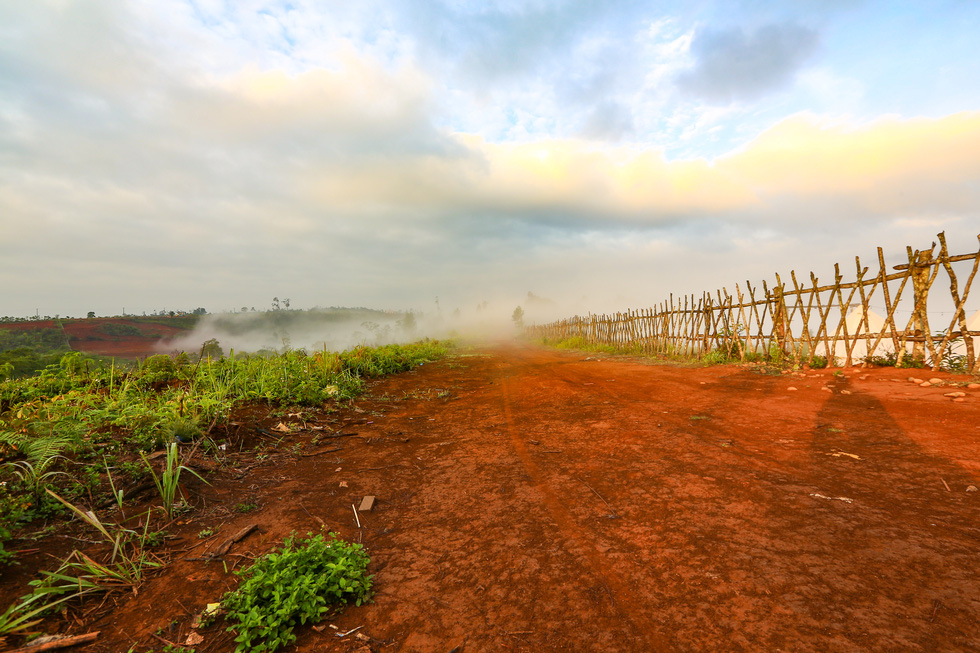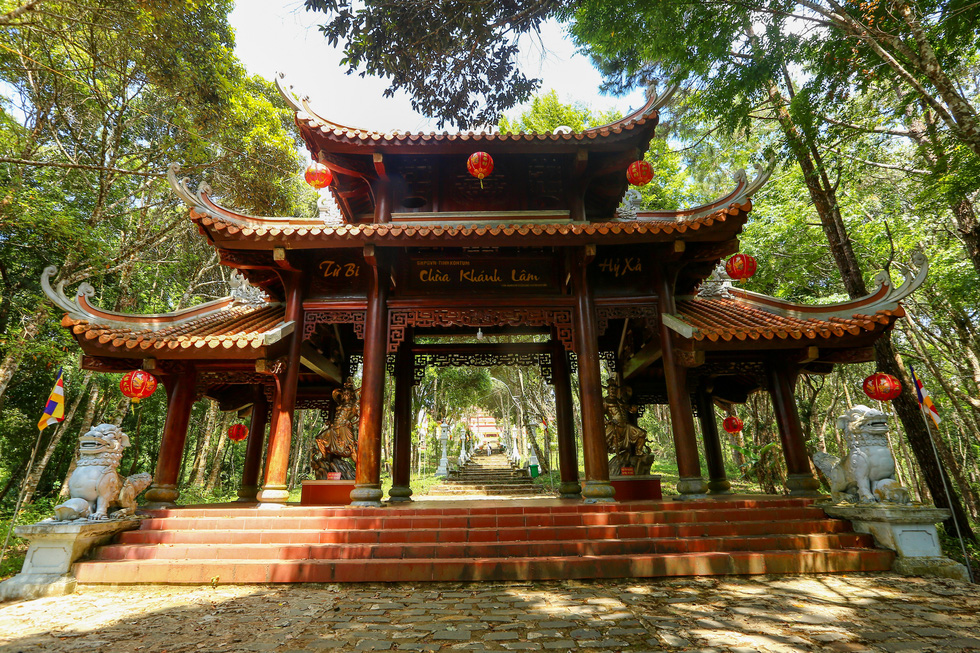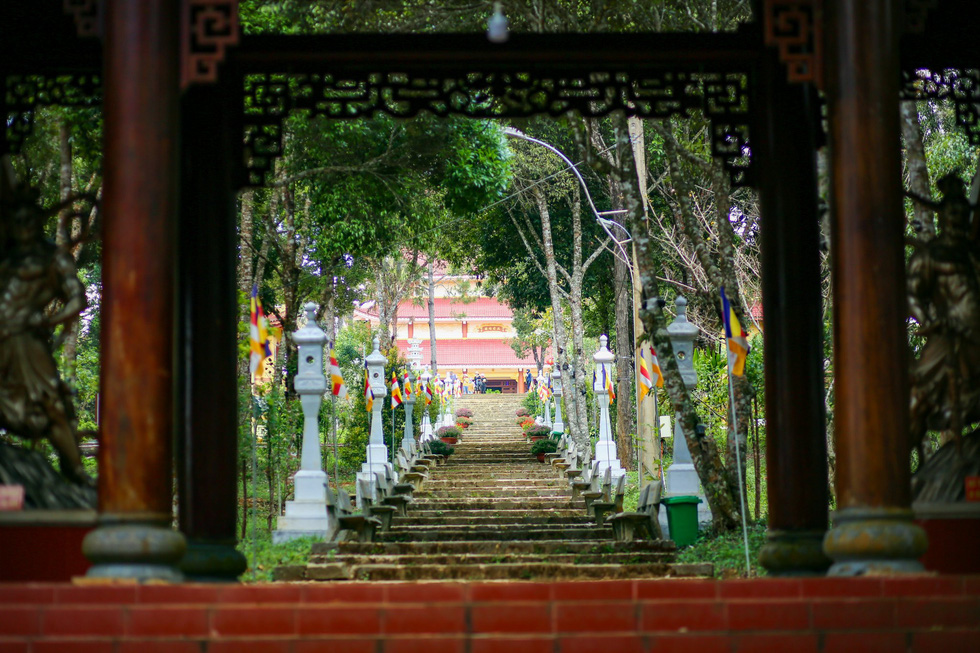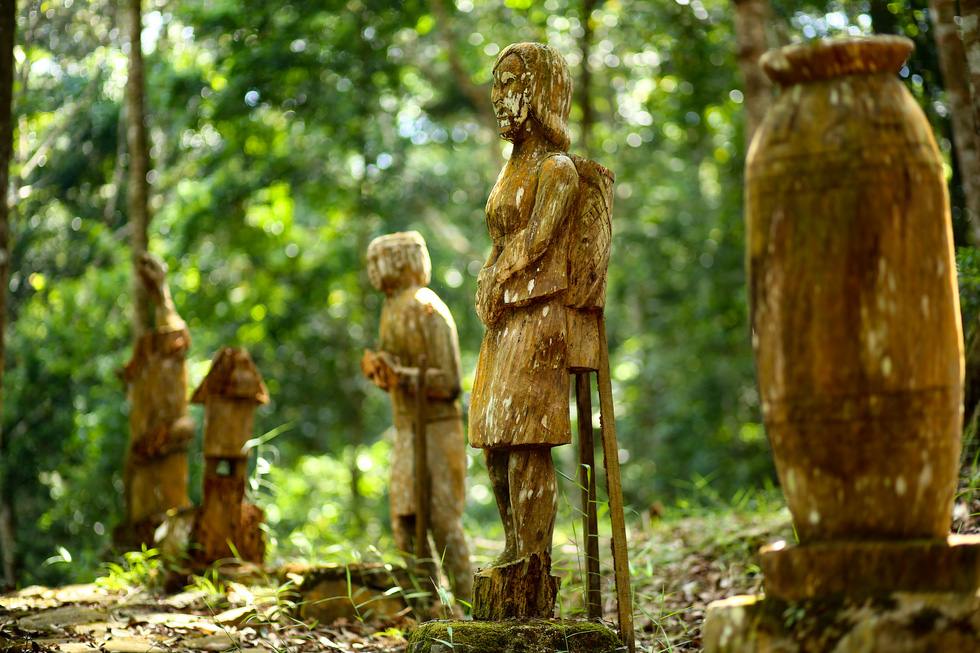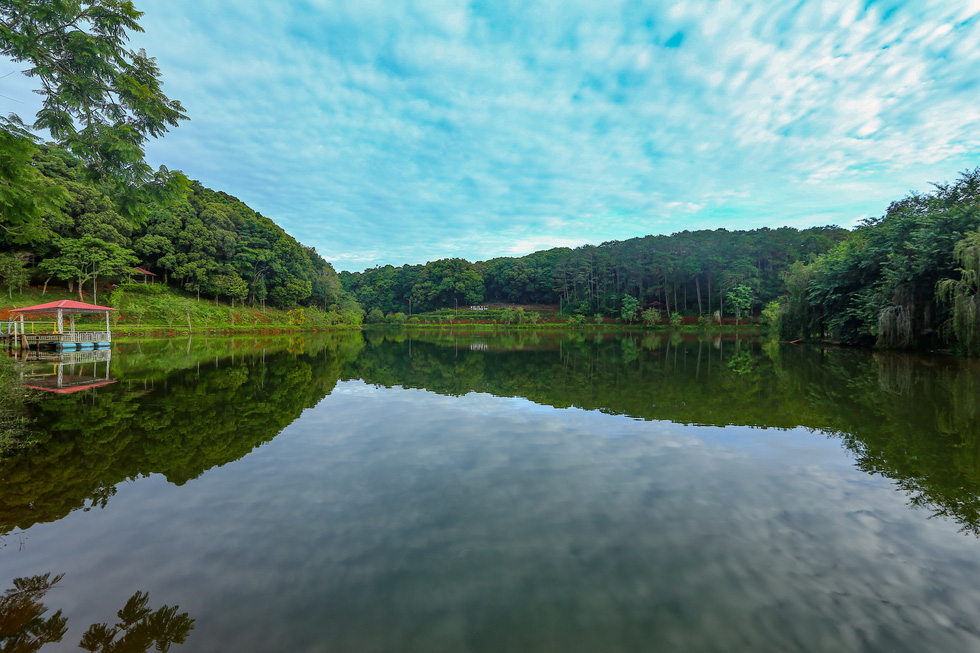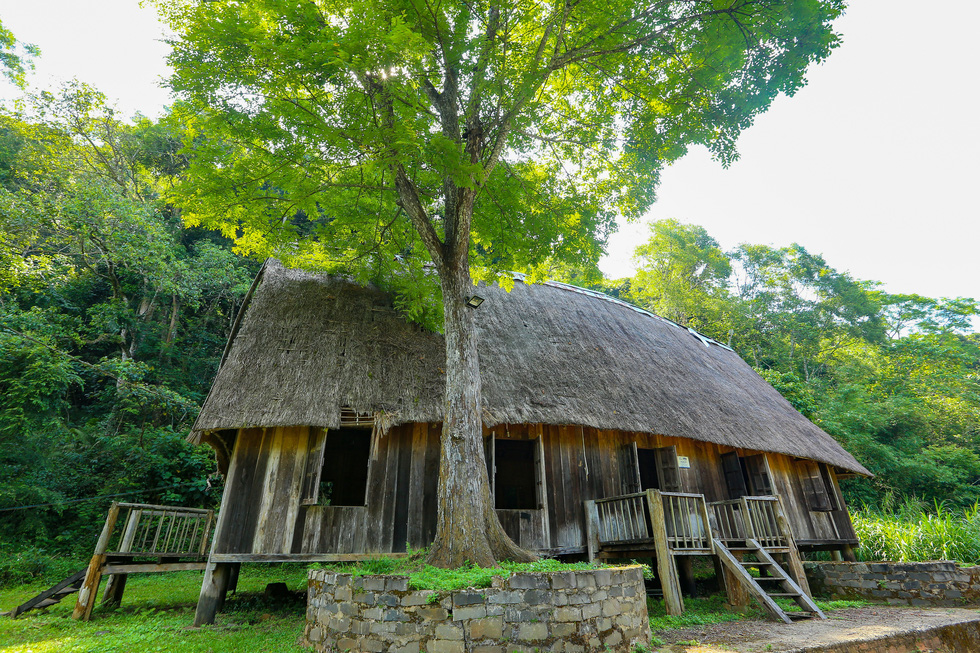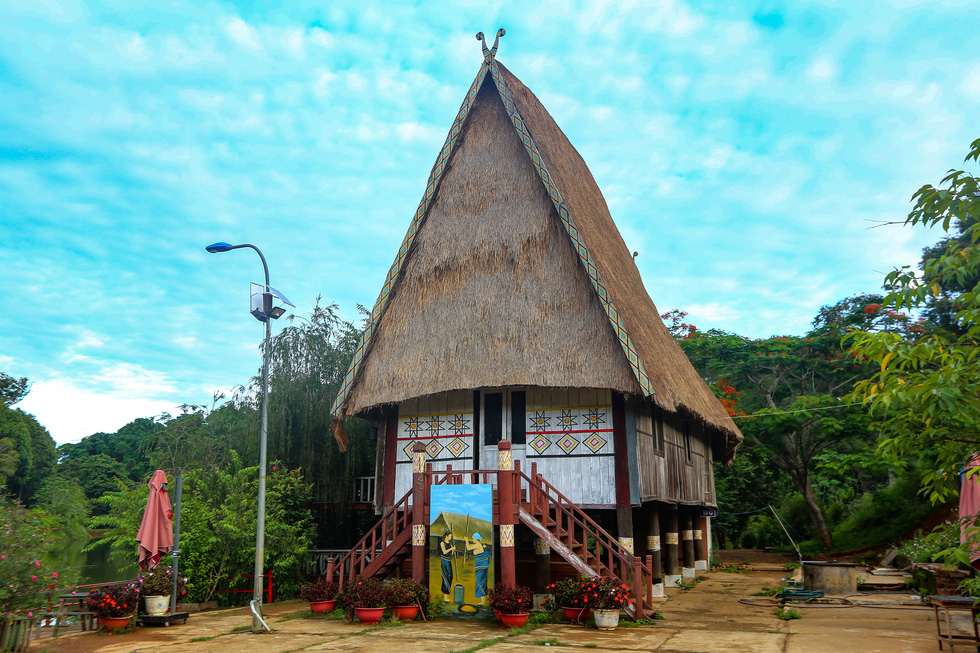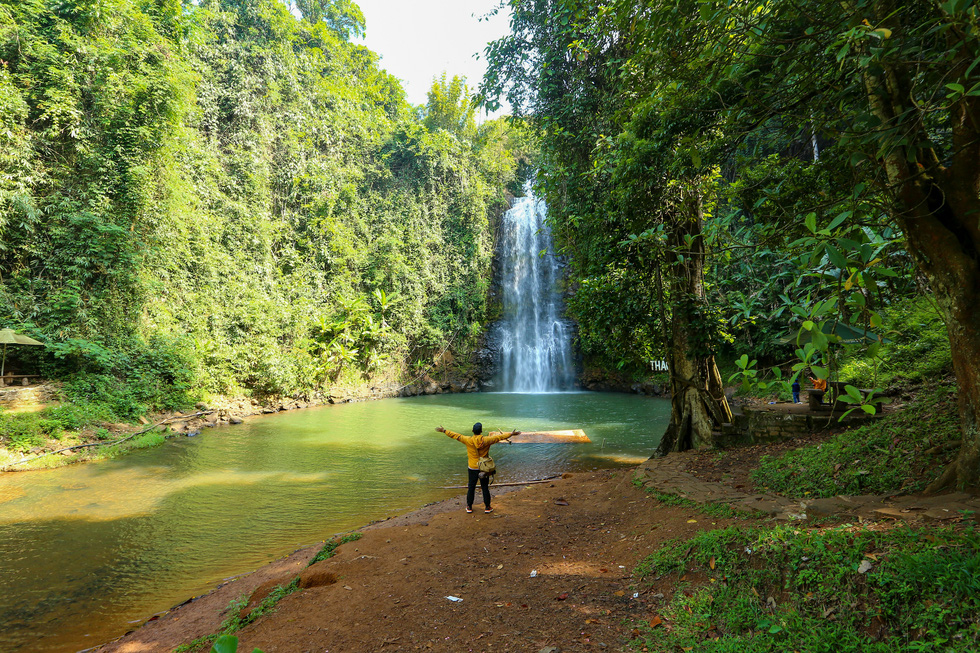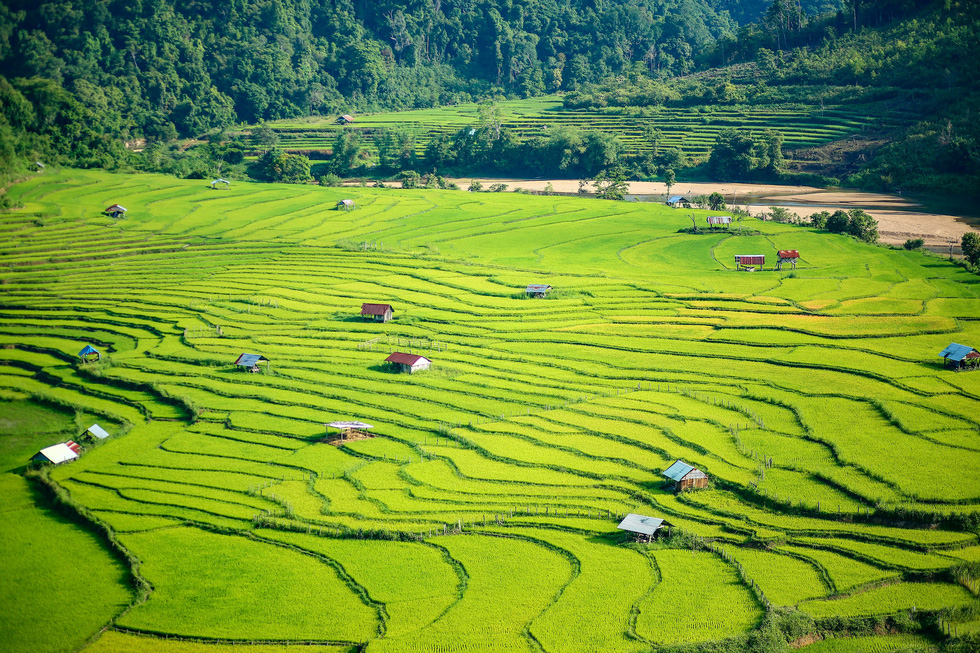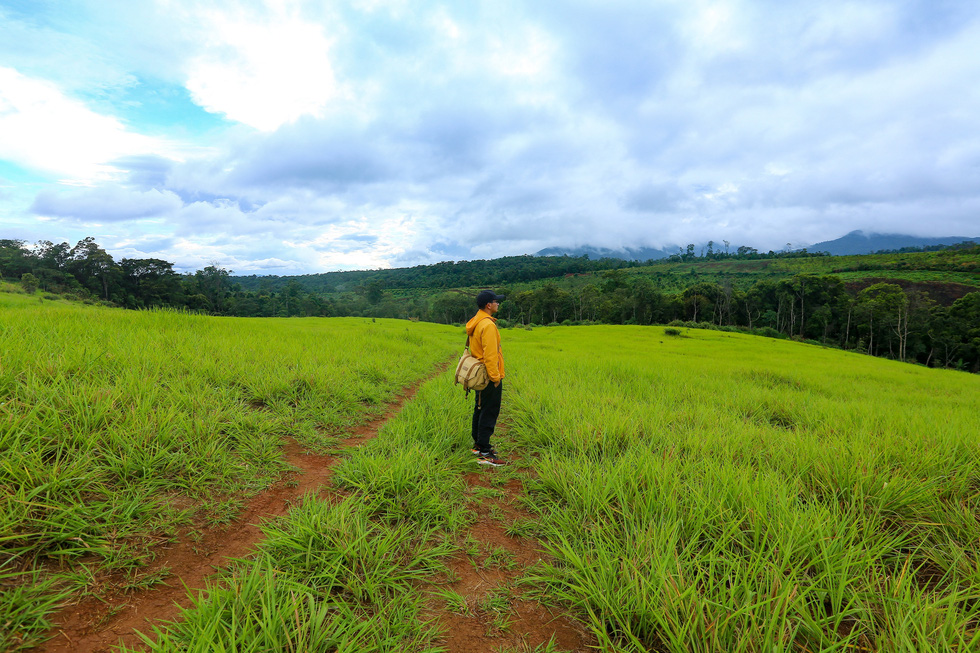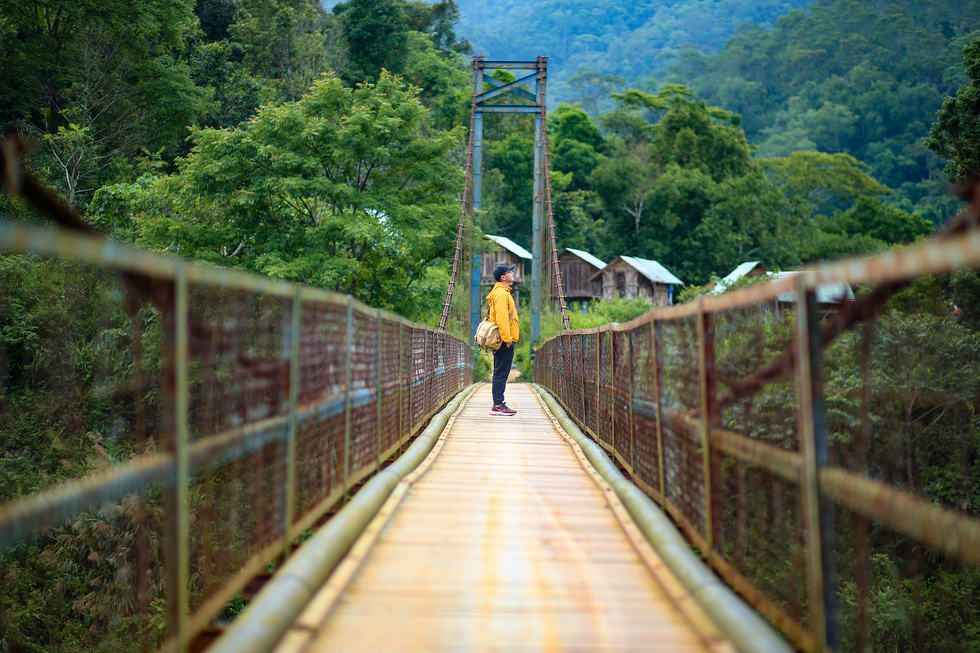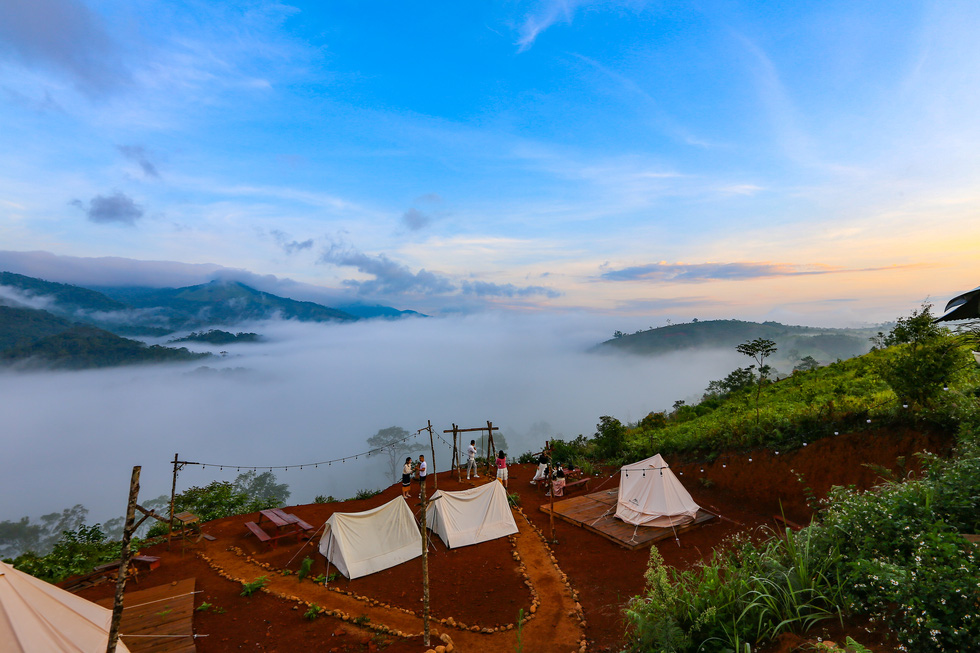Mang Den, a small town in Vietnam's Central Highlands region, is a perfect getaway for backpackers who love unspoiled tourist destinations with immense pine forests, majestic waterfalls, and unpaved red soil roads.
Mang Den is the place where the Mo Nam ethnic minority resides so they gave it the name T'mang Deeng in the Mo Nam dialect.
This is also the origin of the name of Mang Den, which means vast flat land.
|
|
| A moment of sunrise in Mang Den Town in Kon Plong District, Kon Tum Province, Vietnam. Photo: Do Do / Tuoi Tre |
Historically, French people visited Mang Den to do research and selected the location as a resort town.
In order to construct a second Da Lat, pine trees were brought along and planted in this area.
With forests spanning 93.31 percent of the natural area, Mang Den is a tranquil and fascinating spot that any travelers would love to explore in Kon Plong District, Kon Tum Province .
Mang Den climate
Mang Den can be visited all year round because the climate is consistently pleasant, cool, and conducive to sightseeing.
The average temperature ranges from 18 to 25 degrees Celsius.
It is slightly cool in the morning and evening, sunny at noon, and extremely comfortable.
|
|
| Mountainous landscapes and terraced rice fields in Mang Den Town, Kon Plong District, Kon Tum Province, Vietnam. Photo: Do Do / Tuoi Tre |
Mang Den provides seasonal attractions that tourists can experience based on their individual preferences.
From January to May, the atmosphere is comparable to that of Da Lat, a famous hilly tourist city in the region.
Visitors can enjoy the fresh air while contemplating the 'mai anh dao' (cherry-like apricot blossoms), ‘hoa ban’ (Bauhinia variegata blossoms), and ‘hoa sim tim’ (rose myrtle blossoms).
From June to August, the temperature rises slightly but never exceeds 26 degrees Celsius.
During this season, tourists can immerse themselves in the golden hue of ripe rice on terraced fields or observe the blossom season of 'cuc mam xoi’ (chrysanthemum blossoms).
In the final months of the year, as Mang Den approaches winter, tourists can enjoy the cold, pick rose myrtle and docynia indica fruits, and observe the Mexican sunflower blooming.
How to get to Mang Den
Located at an average altitude of 1,000-1,200 meters above sea level in the center of Mang Den Pass and Violăk Pass on Highway 24, Mang Den is a quite challenging destination for adventurous backpackers.
However, it is accessible by plane or passenger bus.
|
|
| An eye-catching view of landscapes in Mang Den Town, Kon Plong District, Kon Tum Province, Vietnam. Photo: Do Do / Tuoi Tre |
Pleiku Airport in Gia Lai Province is approachable to tourists from every province and city in Vietnam.
This airport is around 100 kilometers from Mang Den, so from there, travelers can reach Mang Den by taxi, hotel shuttle, or bus.
If visitors wish to take a passenger bus from Ho Chi Minh City, they can go to the Mien Dong (Eastern) Bus Terminal, from which several direct buses to Mang Den are available.
The bus normally departs in the afternoon, allowing tourists to sleep for 14 to 16 hours before arriving in Mang Den the next morning.
Must-go destinations in Mang Den
The landscape of Mang Den is outside the orbit of industrialization, therefore, visitors there will experience the untouched beauty of primordial mountains, with grand old trees, waterfalls, streams, and green terraced fields.
|
|
| A bird’s-eye view of landscapes in Mang Den Town, Kon Plong District, Kon Tum Province, Vietnam. Photo: Do Do / Tuoi Tre |
The roads in Mang Den are appealing, making them ideal for young trekkers, who might become immersed in winding passes, slopes, beautiful skies, and clouds.
Khanh Lam Pagoda is an intriguing location that tourists should see whilst visiting Mang Den.
The 10-hectare pagoda was built in 2012 on the summit of a 1,200-meter-tall primeval hill.
From the entrance gate, visitors must ascend more than 200 stairs to reach the pagoda.
|
|
| A red soil road in Mang Den Town, Kon Plong District, Kon Tum Province, Vietnam. Photo: Do Do / Tuoi Tre |
Mang Den's most popular tourist attractions are Dak Ke Lake and Dak Ke Waterfall.
About three hectares in size, Dak Ke Lake is surrounded by mountains, which are reflected on the lake's crystal-clear blue surface.
Visitors to this location can enjoy a variety of services, including sightseeing, photography, coffee, boating, and cycling.
|
|
| Khanh Lam Pagoda in Mang Den Town, which was built in 2012. Photo: Do Do / Tuoi Tre |
While Dak Ke is the most beautiful lake, Pa Sy Waterfall, which is situated at an altitude of 1,500 meters, is the highest waterfall in Mang Den.
Fueled by the three largest streams in Mang Den, Pa Sy keeps its beauty untainted by industrialization and modern tourism services.
Numerous tourists admire the garden of wooden figures, which is situated on the path to Pa Sy Waterfall.
|
|
| The stairway to Khanh Lam Pagoda in Mang Den Town, Kon Plong District, Kon Tum Province, Vietnam. Photo: Do Do / Tuoi Tre |
The skilled hands of artists in Mang Den imbued the wooden statues with a variety of hues, reflecting the daily lives of the local ethnic communities.
|
|
| Wooden figures made by local artisans to reflect the daily lives of the local ethnic communities in Mang Den Town, Kon Plong District, Kon Tum Province, Vietnam. Photo: Do Do / Tuoi Tre |
It would be a loss not to mention the terraced fields that weave through the natural scenery and encompass the Mo Nam ethnic settlements.
|
|
| A panoramic view of Dak Le Lake in Mang Den Town, Kon Plong District, Kon Tum Province, Vietnam. Photo: Do Do / Tuoi Tre |
During the harvest season, the landscape of Mang Den will be covered with golden hues, providing a stunning image.
Those having more time can visit the Kon Bring Community Tourism Cultural Village, the statue of the Our Lady of Mang Den, the E Ban Farm, and more.
In addition, tourists can simply find a beautiful café to relax in and enjoy the attractive specialties such as 'com lam ong tre' (rice cooked in bamboo tubes), 'ga nuong Mang Den' (Mang Den grilled chicken), and 'rau rung xao toi' (stir-fried vegetables with garlic).
|
|
| ‘Nha rong’ (stilt house), the unique architectural style of local people in Vietnam’s Central Highlands. Photo: Do Do / Tuoi Tre |
|
|
| A stilt house of local people in Mang Den Town, Kon Plong District, Kon Tum Province, Vietnam. Photo: Do Do / Tuoi Tre |
|
|
| A visitor poses for a photo at Pa Sy Waterfall in Mang Den Town, Kon Plong District, Kon Tum Province, Vietnam. Photo: Do Do / Tuoi Tre |
|
|
| A bird’s-eye view of terraced rice fields in Mang Den Town, Kon Plong District, Kon Tum Province, Vietnam. Photo: Do Do / Tuoi Tre |
|
|
| A visitor poses for a photo at a green hill in Mang Den Town, Kon Plong District, Kon Tum Province, Vietnam. Photo: Do Do / Tuoi Tre |
|
|
| A visitor poses for a photo on a suspension bridge in Mang Den Town, Kon Plong District, Kon Tum Province, Vietnam. Photo: Do Do / Tuoi Tre |
|
|
| Tourists visit a camping coffee shop in Mang Den Town, Kon Plong District, Kon Tum Province, Vietnam. Photo: Do Do / Tuoi Tre |
Like us on Facebook or follow us on Twitter to get the latest news about Vietnam!



